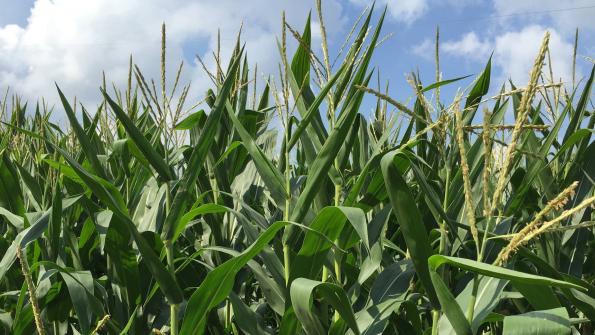
A new corn inoculant that can boost yields will be applied to all Monsanto’s new corn hybrid seeds sold in the U.S. beginning in 2017, the company said Monday.
Acceleron B-300 SAT is a microbial product that Monsanto and Novozymes developed from a naturally occurring soil fungus as part of a revolutionary breakthrough in agriculture, according to The BioAg Alliance, which was created by the companies to develop such formulations.
B-300 grows along corn roots, improving their capacity to take up nutrients. In two years of trials across a wide geography, farmers have seen an average of three bushels per acre in additional yield while using this inoculant, the agribusinesses said.
“Harnessing the power of nature’s microbes, farmers will be able to produce more crops while using fertilizer more efficiently and producing less CO2. This will benefit agriculture, consumers and the environment,” said Colin Bletsky, Novozymes’ Vice President for BioAg.
This is the first product incubated by BioAg. Announced in 2013, it began work in 2014 when Novozymes of Denmark -- a worldwide leader in fermentation and enzyme formulation—teamed up with Monsanto and its vast testing capacity to discover soil microbes that can eventually be used as seed treatments.
“We believe it could be applied to more than 90 million acres by 2025 and become one of the biggest biological products in the ag industry,” Bletsky said.
Building on proven tech
B-300 SAT is an improved version of an existing Novozymes product called JumpStart, an inoculant used across crops that’s especially popular in wheat.
The new coating provides a longer shelf life and is compatible with other seed treatments.
Until now, if you’re a corn farmer in Minnesota, for example, the active ingredient -- spores called Penicillium bilaiae -- would last on the seed only about 120 days. Farmer could not get these spores in the bags of seeds they bought, and this product did not mix well with conventional chemical seed treatments. Farmers using JumpStart must treat their seeds with a short time of planting.
The new formulation, however, lasts two or more years on the seed when stored in viable conditions and is compatible with other seed coating chemistries. Monsanto can now coat seeds before they’re shipping out for retail, making this the first ‘upstream’ corn inoculant ever developed, said John Combest, a spokesman for The BioAg Alliance.
“Seed applied products – whether microbial or chemistry-based – can and should work together to help growers protect their seed investment and get more out of every acre,” said Juan Ferreira, Global Vice President of Monsanto’s Vegetable Seeds, Seed Applied Solutions and Crop Protection businesses.
“Combining the fermentation and formulation expertise of Novozymes’ scientists – along with the innovative approach to seed coating and field-testing capabilities of the Monsanto team – produced a product that will give growers more flexibility in their application decisions and can ultimately result in higher yield.”
The product’s name is an acronym for Acceleron Biological 300 Seed Applied Technology. It will be part of Monsanto’s Seed Applied Solutions portfolio and applied to all brands.
The BioAg field trials of microbial coatings represent the world’s biggest such testing program. Results have found that they help roots systems extend and plants grow better with improved abilities to fight off diseases and pests.
Monsanto and Novozymes plan to eventually expand the sale of the B-300 coated seeds abroad.
The agricultural market for microbials is estimated at $1.8 billion. The market for traditional fertilizers and pesticides totals $240 billion, The BioAg Alliance says.
Developed from soil fungi or bacteria, microbials have the potential to replace or complement traditional chemistry products and develop food in a sustainable way. They are used by organic food growers, particularly for vegetables.
Highlights of The BioAg Alliance’s 2016 microbial discovery field trial results, along with 2017 field trial plans, will be announced on Jan. 5, 2017.
About the Author(s)
You May Also Like






